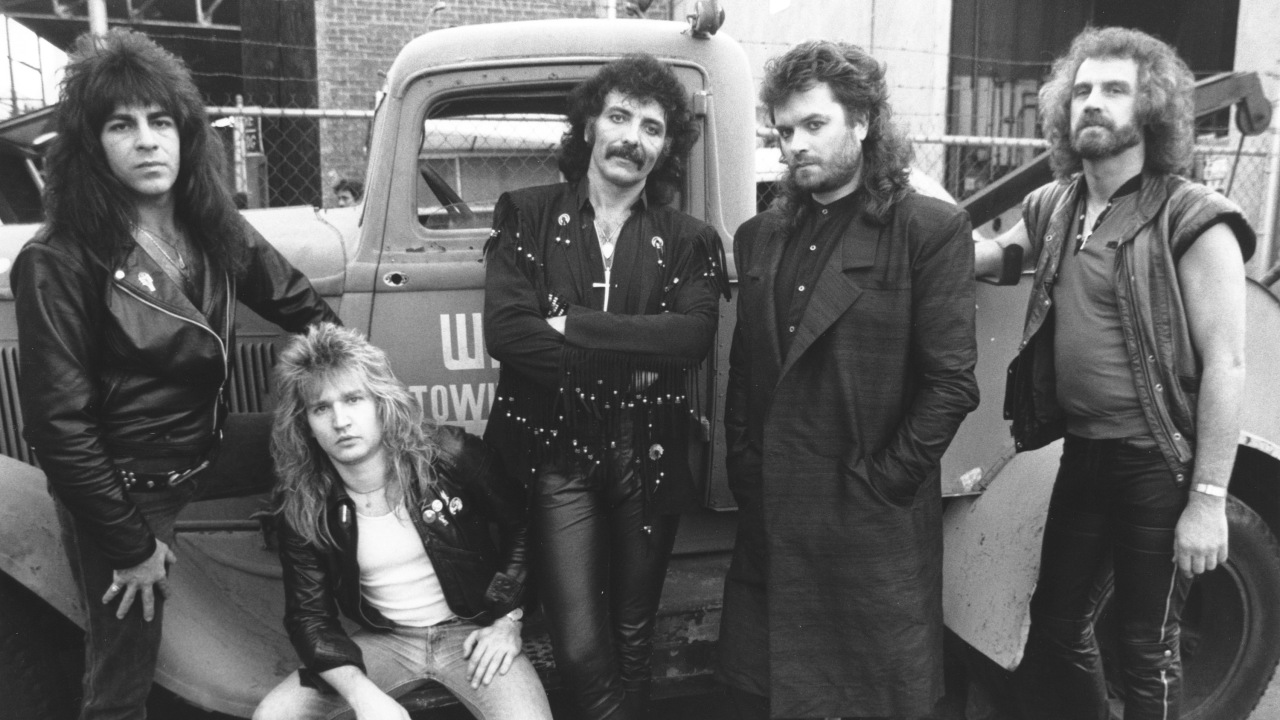One Album Wonders
A one-off never to be forgotten

The news that former Mötley Crüe vocalist John Corabi has been performing his old band’s self-titled 1994 album on tour got us thinking about bands who’ve recruited a new frontman or guitarist for just one album, capturing one, never-to-be-repeated moment in their career. Here’s eight stand-alone albums worth investigating…
Faith No More – King For A Day… Fool For A Lifetime
When ‘Big Sick Ugly’ Jim Martin was fired from/quit Faith No More following the completion of the touring cycle for 1992’s_ Angel Dust_ album, Mike Patton recommended his childhood friend (and fellow Mr Bungle member) Trey Spruance as his replacement. This line-up of FNM duly recorded the excellent, thrillingly eclectic King For A Day… album, but Spruance elected not to tour with the band, leading to keyboard tech Dean Menta holding down the position for the following two years. Curiously, in 2011 Spruance played his very first gig with the band in Santiago, Chile, at a special one-off show where the quintet performed King For A Day… in its entirety. Fuck knows why, but then it’s often best not to try to second guess Faith No More’s peculiarly warped logic.
Black Sabbath – Seventh Star
Following an ill-fated collaboration with ex-Deep Purple frontman Ian Gillan on 1983’s Born Again album, Geezer Butler and Bill Ward quit Black Sabbath leaving Tony Iommi as the group’s only original member. The disillusioned guitarist duly decided to park the Sabbath name and record a solo record, for which he recruited old friend Glenn ‘The Voice Of Rock’ Hughes (coincidentally another Deep Purple alumni) on vocals. When the album was completed however, Iommi’s management decided that it should be released not as an Iommi solo project, but as ‘Black Sabbath featuring Tony Iommi’, a calculated move to trade on the commercial pull of the Sabbath name. The problem with this, however, was that with its glossy production and more conventional hard rock stylings, Seventh Star sounded absolutely nothing like a Sabbath album. On tour in the US, the union swiftly ended in tears, with Hughes getting into a physical altercation with the band’s tour manager, and being sacked after just five dates: Iommi’s non-confrontational but less-than-subtle way of firing the singer was simply to slip a UK-bound flight ticket under his hotel room door. Ouch.
Motörhead – Another Perfect Day
‘Fast’ Eddie Clarke’s decision to quit Motörhead during their Iron Fist world tour forced Lemmy into a hasty decision to replace the guitarist: ex-Thin Lizzy man Brian Robertson, an old drinking buddy, wasn’t the most obvious recruit to fill the hole, but Lemmy knew he had the chops to fulfil the band’s engagements. The new-look Motörhead recorded just one album, 1983’s Another Perfect Day, after which relations with the fiery Scot broke down, not helped by Robertson’s reluctance to play Clarke-era standards or indeed his decision to appear onstage wearing satin shorts and ballet shoes. At the time, the more melodic Another Perfect Day was viewed as a rare mis-step by this most incorruptible of bands, but afforded greater perspective, the collection boasts many fine songs, some of which have retained a place in the band’s live sets to this day.
The latest news, features and interviews direct to your inbox, from the global home of alternative music.
Red Hot Chili Peppers – One Hot Minute
Finding his new-found celebrity hard to deal with, guitarist John Frusciante bailed out of the Chili Peppers during a Japanese tour supporting the hugely successful Blood Sugar Sex Magik album. On paper, his replacement was a perfect fit, the mercurial Dave Navarro having grown up on the LA club scene alongside Anthony Kiedis and Flea as a founding member of the brilliant Jane’s Addiction. Unfortunately, his acceptance into the Chilis came at a time when Kiedis’ own addictions were becoming an issue, casting dark shadows over the recording of the One Hot Minute album. A commercial disappointment, selling only half as many copies as its predecessor, OHM is often unfairly overlooked (not least because, with Frusciante back in the fold, 1999’s Californication was a genuine phenomenon), but its dark, layered psychedelia has stood the test of time, and the likes of My Friends and Transcending are among the finest songs in the band’s catalogue.
Thin Lizzy – Black Rose: A Rock Legend
Gary Moore and Phil Lynott first played together as teenagers in Dublin, though both were keenly aware that their respective musical ambitions might be difficult to reconcile in a shared band. Though the Belfast-born guitarist briefly joined (and swiftly exited) Thin Lizzy following the departure of original guitarist Eric Bell, it was not until the departure of Brian Robertson from the band’s ‘classic’ line-up that he threw his lot in with Lynott on a more sure footing. The Lynott/Moore/Gorham/Downey axis would record just one album, but it’s one of the strongest in Lizzy’s storied career, with the likes of Waiting For An Alibi, Do Anything You Want To, Got To Give It Up and the Lynott/Moore co-writes Sarah and Róisín Dubh becoming, and remaining, firm fan favourites.
Dio – Lock Up The Wolves
In 1989 Ronnie James Dio decided to completely revamp his solo band, and recruited unknown English teenager Rowan Robertson as his new guitarist and songwriting foil, perhaps hoping to recreate some of the chemistry he’d shared with the youthful Vivian Campbell on his first solo albums. Robertson stepped up to the plate in some style, his flashy, energetic playing giving the veteran vocalist a new lease of life. Their partnership, however, would not get time to mature, for just 12 months after the album’s release Dio accepted an invitation to re-join Tony Iommi and Geezer Butler in the latest incarnation of Black Sabbath. In truth, as with so many of his peers, the arrival of grunge may have forced some changes in Dio’s outlook regardless, but Lock Up The Wolves remains something of a curio, and an unresolved chapter, for fans of the late, great vocalist.
Deep Purple – Come Taste The Band
When Ritchie Blackmore quit Deep Purple in 1975, it seemed as if the writing might be on the wall for the great British rock institution. Frontman David Coverdale, himself a relatively recent recruit to the band, persuaded Jon Lord to give the group another shot, recruiting American guitarist Tommy Bolin in Blackmore’s place. The resulting album, 1975’s Come Taste The Band, extended the heavy funk/soul direction explored on the Mark III line-up’s Burn and Stormbringer albums, but Bolin’s more jazz-influenced playing wasn’t wholly embraced by fans tiring of Purple’s shifting focus. Just six months after the album’s release Lord and drummer Ian Paice dissolved the group: nine months later Bolin died of a heroin overdose, aged 25, ensuring no way back for this version of the legendary band.
Poison – Native Tongue
A backstage fistfight between Bret Michaels and CC DeVille at the 1991 MTV Video Music Awards led to Poison’s founding guitarist receiving his marching orders from the LA hair-metal troupe: in his place came hot-shot six-stringer Richie Kotzen, who’d cut his first solo album at age 19. The Poison which returned with Native Tongue in 1993 bore little resemblance to the band’s bubblegum origins, with Kotzen bringing blues and funk chops and a new-found musical maturity to the band… a situation roundly mocked by music critics who saw their reinvention as a calculated reaction to the era’s dominant grunge sound. CC Deville would return to the fold within three years. The talented Kotzen now plays with Billy Sheehan and Mike Portnoy in Winery Dogs, and it’s fair to say that he’s unlikely ever to ‘pull a Corabi’ and head out on the road promoting this particular chapter of his history.

A music writer since 1993, formerly Editor of Kerrang! and Planet Rock magazine (RIP), Paul Brannigan is a Contributing Editor to Louder. Having previously written books on Lemmy, Dave Grohl (the Sunday Times best-seller This Is A Call) and Metallica (Birth School Metallica Death, co-authored with Ian Winwood), his Eddie Van Halen biography (Eruption in the UK, Unchained in the US) emerged in 2021. He has written for Rolling Stone, Mojo and Q, hung out with Fugazi at Dischord House, flown on Ozzy Osbourne's private jet, played Angus Young's Gibson SG, and interviewed everyone from Aerosmith and Beastie Boys to Young Gods and ZZ Top. Born in the North of Ireland, Brannigan lives in North London and supports The Arsenal.
